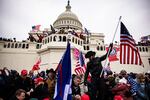
Pro-Trump supporters storm the U.S. Capitol following a rally with then-President Donald Trump on January 6, 2021 in Washington, D.C.
Samuel Corum / Getty Images
President Trump issued pardons for some 1,500 defendants who participated in the siege on the U.S. Capitol four years ago, wiping away scores of convictions for people who helped delay the certification of the 2020 election and upend the peaceful transfer of power.
He also commuted the sentences of six people, he said in a signing ceremony at the Oval Office on Monday, without offering immediate details.
“We hope they come out tonight,” he said.
The hours-long assault on the Capitol on Jan. 6, 2021, injured more than 140 police officers, in one of the largest-ever mass attacks on law enforcement officers in the United States. U.S. Capitol and Washington, D.C., police persisted in defending the building, in the face of getting sprayed with harsh chemicals or beaten with flagpoles.
On the campaign trail, Trump regularly featured the stories of Jan. 6 defendants he labeled “hostages” and “patriots.” Loudspeakers at Trump rallies blared a version of the national anthem sung by a choir of incarcerated rioters.
The pardons largely undo the results of one of the most complicated investigations in the history of the Justice Department. Prosecutors and FBI agents there spent years probing the actions of people at or near the Capitol on Jan. 6, using photos, video and telephone location data to help identify potential suspects.
Federal judges in Washington, where the courthouse cafeteria boasts a view of the Capitol dome and the scene of the crime, generally imposed lighter punishments than the DOJ had requested in hundreds of Jan. 6 cases. But they also pushed back hard in their courtrooms against efforts to rewrite the history of that day, amid claims from Trump and his allies that the rioters had been unfairly targeted for prosecution.
One D.C. district court judge appointed by Trump, Carl Nichols, recently said in court that blanket pardons for the Capitol defendants would be “beyond frustrating and disappointing.”
The investigation became a priority for former Attorney General Merrick Garland, who told NPR a year after the attack on the Capitol that “every FBI office, almost every U.S. attorney’s office in the country is working on this matter. We’ve issued thousands of subpoenas, seized and examined thousands of electronic devices, examined terabytes of data, thousands of hours of videos.”
But the Justice Department’s case against Trump, for allegedly conspiring to cling to power and deprive millions of Americans of the right to have their votes count in 2020, ended with a whimper.
Special counsel Jack Smith secured a four-count felony indictment of Trump but said he was forced to abandon the case after Trump won the 2024 election, based on a longstanding DOJ view that a sitting president cannot be charged or face trial.
Smith said in court papers that the government “stands fully behind” the case it developed.